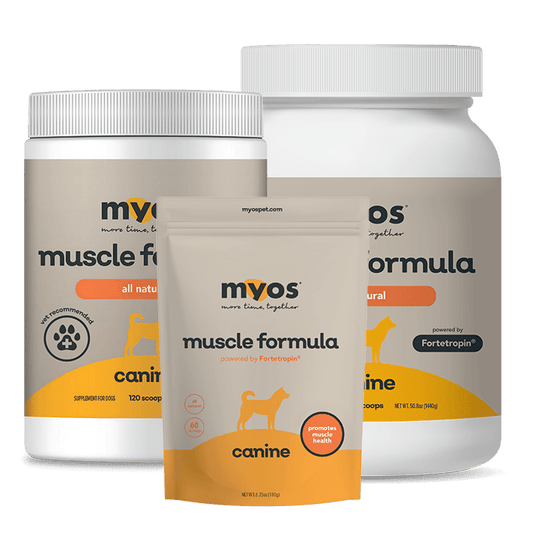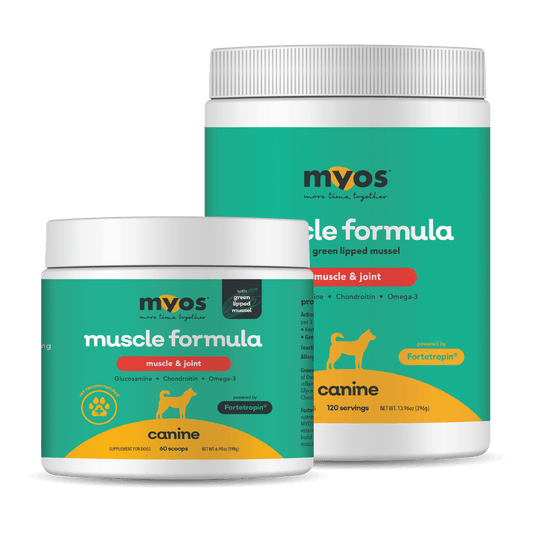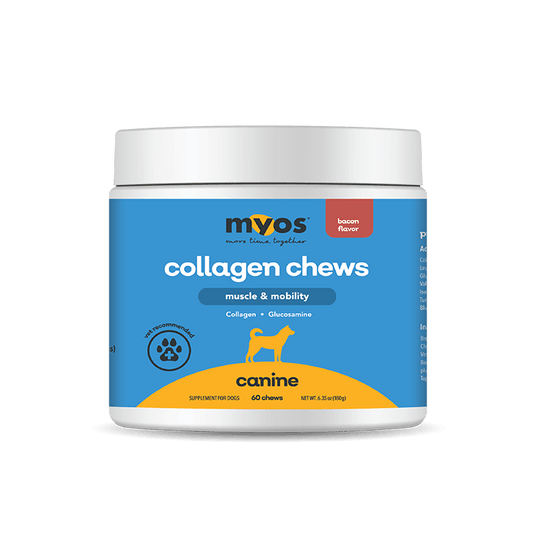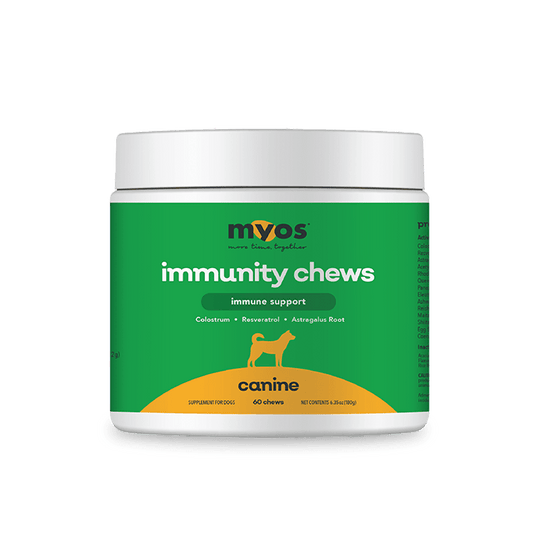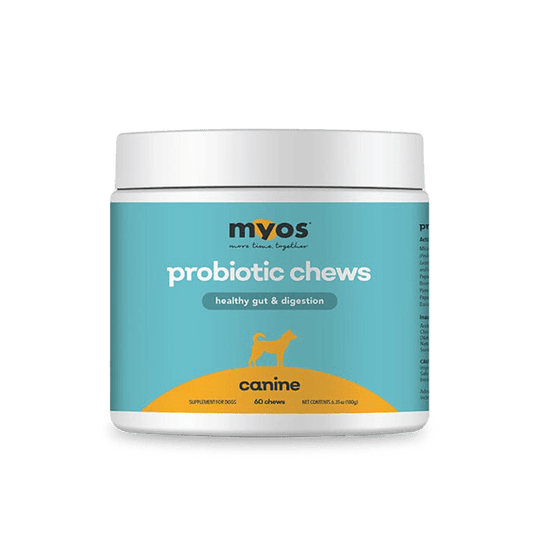What is Fortetropin®?
We take one of the most nutrient-dense foods on Earth, fertilized egg yolk and we make it better.
We do this using a two-step process that involves 1) high pressure pasteurization and 2) low temperature drying. Traditional, heat pasteurization is very effective in terms of destroying harmful pathogens but it also degrades many of the protein, peptides and lipids that help you maintain optimal health!
Below we discuss why you need to add Nature’s Multivitamin® to your dog’s diet.
Improved Muscle Health = Improved Longevity

Fortetropin® promotes muscle growth and development.
- In a randomized, double blind, placebo-controlled clinical trial at Kansas State University College of Veterinary Medicine, a daily dose of Fortetropin® helped prevent muscle loss in dogs undergoing TPLO surgery, one of the most common veterinary surgery procedures performed in the U.S. [1].
- Muscle loss is the main cause of frailty and research at Ecole Nationale Vétérinaire d'Alfort, France has shown that dogs with moderate to severe frailty have a significantly higher mortality rate than dogs with relatively mild frailty [2]
- According to research at Tufts University School of Veterinary Medicine, dogs with serious muscle loss suffering from chronic heart failure (CHF) have a much lower survival rate than dogs with CHF that are in much better muscle health [3].
Guarding Your Dog’s Vision

Fortetropin® is a rich source of lutein and zeaxanthin.
- Lutein and zeaxanthin are two powerful antioxidants that have been shown to prevent age-related macular degeneration (AMD) in humans [4,5] and dogs [6].
- AMD is one of the leading causes of blindness in the Western World.
Protecting Your Dog’s Bones

Vitamin D and calcium are essential for healthy bones. Healthy muscle is also essential for healthy bones.
- Human clinical trials have shown that taking Fortetropin® while performing moderate resistance training builds muscle mass [7] and Veterinary clinical trials have shown that Fortetropin® prevents muscle loss in dogs after TPLO surgery [1].
- There is extensive “crosstalk” between muscle tissue and bone. Muscle tissue secretes “myokines” such as insulin growth factor-1 (IGF-1) and fibroblast growth factor-2 (FGF-2) that play an important role in bone development [8].
- Fortetropin® is a rich source of Vitamin D that is essential for calcium absorption, a process which is necessary to maintain healthy bones [9].
Help Your Dog Maintain A Healthy Weight

Help your dog feel full longer.
- Fortetropin® is made from fertilized chicken eggs which are a very dense source of nutrition with one egg providing 5 grams of fat, 6 grams of protein along with vitamins and minerals such as Vitamin D, calcium and zinc.
- In a 2005 study published by researchers at St. Louis University, overweight human participants that consumed an egg-based breakfast were found to consume fewer calories before lunch relative to those who consumed a bagel-based breakfast [10]. Adding Fortetropin® to your dog’s meal may help them feel ‘fuller’ longer and keep them from putting on weight as they get older.
Help Your Dog Stay Sharp

Choline is a key ingredient that your body needs to make a vital neurotransmitter
- Fortetropin® is a rich source of the nutrient, choline which is an important precursor for the neurotransmitter, acetylcholine and plays a pivotal role in brain development. In aging dogs, levels of choline decrease [11].
- Researchers at the University of Illinois demonstrated in a study involving pigs that a deficiency in choline results in altered gray matter and reduced white matter in the of young pigs [12].
References:
- White, Dana., et al. PLOS One (2020), “The impact of Fortetropin® supplementation on dogs recovering from Tibial-Plateau Leveling Osteotomy (TPLO) surgery.” Revised manuscript submitted.
- Hua, J., Hoummady, S., Muller, C., Pouchelon, J. L., Blondot, M., Gilbert, C., & Desquilbet, L. (2016). Assessment of frailty in aged dogs. American journal of veterinary research, 77(12), 1357-1365.
- Slupe, J. L., L. M. Freeman, and J. E. Rush. "Association of body weight and body condition with survival in dogs with heart failure." Journal of veterinary internal medicine3 (2008): 561-565.
- Age-Related Eye Disease Study Research Group. "A randomized, placebo-controlled, clinical trial of high-dose supplementation with vitamins C and E, beta carotene, and zinc for age-related macular degeneration and vision loss: AREDS report no. 8." Archives of ophthalmology10 (2001): 1417.https://www.ncbi.nlm.nih.gov/pmc/articles/PMC1462955/
- Chew, Emily Y., et al. "Lutein+ zeaxanthin and omega-3 fatty acids for age-related macular degeneration: the Age-Related Eye Disease Study 2 (AREDS2) randomized clinical trial." JAMA-Journal of the American Medical Association19 (2013): 2005-2015. https://jamanetwork.com/journals/jama/fullarticle/1684847
- Wang, Wei, et al. "Antioxidant supplementation increases retinal responses and decreases refractive error changes in dogs." Journal of nutritional science 5 (2016).
- Sharp, Matthew H., et al. "The Effects of Fortetropin Supplementation on Body Composition, Strength, and Power in Humans and Mechanism of Action in a Rodent Model." Journal of the American College of Nutrition8 (2016): 679-691.
- DiGirolamo, Douglas J., Douglas P. Kiel, and Karyn A. Esser. "Bone and skeletal muscle: neighbors with close ties." Journal of bone and mineral research7 (2013): 1509-1518. https://onlinelibrary.wiley.com/doi/full/10.1002/jbmr.1969.
- Bikle, Daniel D. "Vitamin D and bone." Current osteoporosis reports2 (2012): 151-159. https://link.springer.com/article/10.1007/s11914-012-0098-z
- Vander Wal, Jillon S., et al. "Short-term effect of eggs on satiety in overweight and obese subjects." Journal of the American College of Nutrition6 (2005): 510-515. https://www.tandfonline.com/doi/abs/10.1080/07315724.2005.10719497
- Hecht, Silke, and Amy Hodshon. "AGING CHANGES OF THE BRAIN." Diagnostic MRI in Dogs and Cats(2018): 318.
- Mudd, Austin T., Caitlyn M. Getty, and Ryan N. Dilger. "Maternal Dietary Choline Status Influences Brain Gray and White Matter Development in Young Pigs." Current Developments in Nutrition6 (2018): nzy015. https://academic.oup.com/cdn/article/2/6/nzy015/4950391

